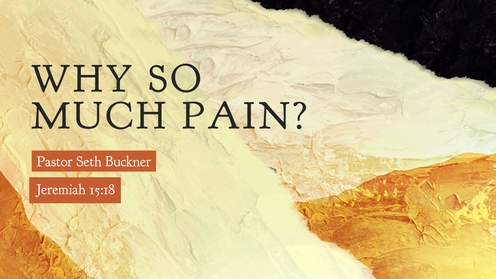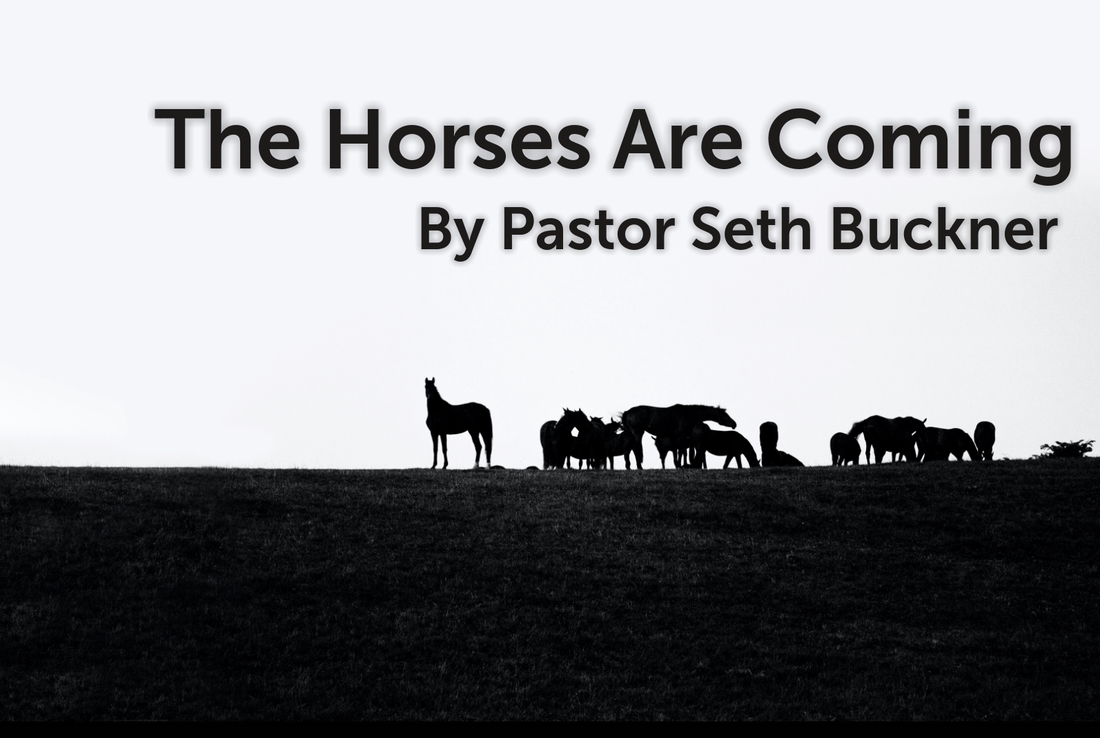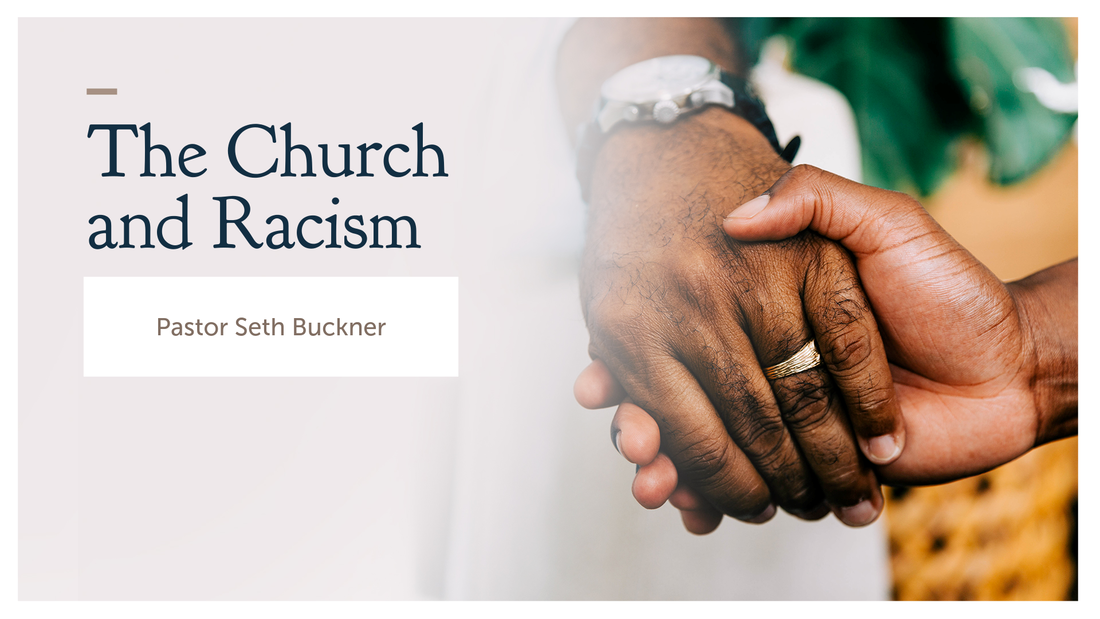 The prophet asked God this question in Jeremiah 15:18: “Why is my pain perpetual, and my wound incurable, which refuseth to be healed?” Perpetual has the idea of a strong, everlasting pain. This is both a mental and physical agony that cannot be wiped away with a quick trip to the doctor or a pharmaceutical prescription. Job suffered from this overwhelming pain, and his friends noticed. Job 2:13 says, “So they (His friends) sat down with him (Job) upon the ground seven days and seven nights, and none spake a word unto him: for they saw that his grief was very great.” Why is there so much hurting in this world? I do not think that this question is answered completely in this short piece, but there are answers found in the Scriptures. Jeremiah received an immediate answer. In Jeremiah 15:20 God says, “I will make thee unto this people a fenced brasen wall: and they shall fight against thee, but they shall not prevail against thee: for I am with thee to save thee and to deliver thee, saith the LORD.” “Brasen” is hardened and tempered, like steel. God will make you strong enough to handle what comes your way. God knows the end from the beginning, and He can make us strong enough to withstand anything this world sends our direction. God continued in verse 21 by saying, “I will deliver thee out of the hand of the wicked, and I will redeem thee out of the hand of the terrible.” The Lord does not promise we will not have troubles but promises to deliver the righteous in time of trouble. Pain is going to come our way, but deliverance is available to those who trust in Him. Jesus understands great pain, even perpetual pain. He suffered as no one ever has on the cross for our sins. 1 Peter 2:21 says, “For even hereunto were ye called: because Christ also suffered for us, leaving us an example, that ye should follow his steps.” If you are suffering mental or physical distress, turn to the Great Physician. He understands your pain more than you do yourself.
0 Comments
 Do you ever feel your service is not appreciated? You are not the only person. An elderly missionary was returning home after many years of service. He and his wife had given their best years serving in Africa. He buried his wife and two children in the jungle. He had sacrificed more than most and was sick and weary. As he exited the airplane, he saw many people holding banners and signs waiting at the gate. For a few moments he thought, “Can it be? After more than forty years of service, these people have actually come out to welcome me home?" It was not for him. On the same plane was a famous official returning from a visit to Africa. While in Africa and traveling this man had every whim and need met. He returned home like a conquering hero. Not a person showed up to welcome the old missionary. As he watched the festivities for the famous official, the man’s sadness became almost unbearable. Tears came, and he began to feel sorry for himself. After a while, the missionary started to pray. "Lord God in Heaven, why? I’ve served You faithfully for so long. I don’t assume much. Is it wrong to wish for there be some kind of a welcome home?" In his heart, the old man heard the Lord say, "My child, you are not home yet." Wow, what a truth! Jesus said to His disciples, “In my Father’s house are many mansions. I go to prepare a place for you.” Jesus then continued, “I will come again, and receive you unto myself; that where I am, there ye may be also.” Please stay faithful. Your service has caught heaven’s attention and reward will come in due time. You are not home yet.  Jeremiah 12:5a says, “If thou hast run with the footmen, and they have wearied thee, then how canst thou contend with horses?” What an unusual question God asked Jeremiah. The idea behind this verse is that if you cannot handle the little things in your life, how will you fair when a big problem arrives. Jeremiah felt his current difficulties were weighty, but God was warning him of bigger ones on the way. Life deals people problems almost daily. Most folks will experience major trials multiple times during their lifetimes. If the little challenges consistently get you down, how will you ever cope with the big ones that are in your future? If you know the Bible even a little, you understand that big problems are coming for this world. 2 Timothy 3:1 says, “This know also, that in the last days perilous times shall come.” It is quite possible that the trials Americans are undergoing are a tiny portion of what we will see in the coming years. If current hardships have us constantly complaining and wanting to quit, how will we handle the larger problems we could soon face in our nation? God is rebuking Jeremiah for his soft attitude. God does not want a sissy but a soldier, and He expects the same from us. 2 Timothy 2:3 say, “Thou therefore endure hardness, as a good soldier of Jesus Christ.” Are current trials affecting your spiritual walk? Horses are coming, so we had better learn now how to run. Hebrews 12:1 says, “Wherefore seeing we also are compassed about with so great a cloud of witnesses, let us lay aside every weight, and the sin which doth so easily beset us, and let us run with patience the race that is set before us.” The Lord has promised strength and endurance for those who trust in Him. Isaiah 40:31 says, “But they that wait upon the LORD shall renew their strength; they shall mount up with wings as eagles; they shall run, and not be weary; and they shall walk, and not faint.” Trials come our way to test us and make us stronger. Pass the test!  It would have been impossible for America to have won the Revolutionary War and freedom without God’s help. It was a ‘David vs. Goliath’ battle, and Goliath wins every time unless God intervenes. Seven years before he died, George Washington wrote, “I am sure that never was there a people who had more reason to acknowledge a Divine interposition in their affairs, than those of the United States.” One of the amazing battles early in the war was the battle of Bunker Hill, which was actually fought on Breeds Hill. Why does history still name it to have been fought on Bunker Hill? I believe it was because the spiritual battle was fought there by a Connecticut Baptist preacher named David Avery. Avery wrote in his diary, “I stood on a neighboring hill (Bunker) with hands uplifted, supplicating the blessing of Heaven to crown our unworthy arms with success…” As he prayed, historians write that one could literally feel the surge of reassurance pervade the ranks below him. Many feel that the bitter experience at this battle psychologically crippled the British for the remainder of the war. General Gage wrote, “The success, which was very necessary in our present condition, cost dear.” There is no doubt that they showed a healthy respect for American forces after this bloody battle. The British “won” this battle at great cost, but the real victory was won by a chaplain on the higher elevation who prayed during the entire conflict. If space would allow, many more miracles could be shared of God’s power to give us freedom. It is sad to watch as America turns away from the One Who created her. I challenge you on this July 4th to recognize the God who gave you this freedom by attending church this weekend and to thank Him for the freedoms you have enjoyed. My prayer is that God will continue to show mercy on this nation.  Racism is a heated issue today, and sadly most of the world has chosen an unpleasant response to the issue. Jeremiah 13:23 says, “Can the Ethiopian change his skin, or the leopard his spots? then may ye also do good, that are accustomed to do evil.” Although it is not the primary emphasis, this verse clearly shows the folly of racism. No one can change their skin. It is a gift from God. People cannot affect their color and they should not want to do so. God is not color blind, since He made people red, yellow, black, white and brown after His own image. We should all be glad just the way that God created us. Racism has been around for a long time. Numbers 12:1 says, “And Miriam and Aaron spake against Moses because of the Ethiopian woman whom he had married.” God brought judgement into their lives because of this. God is not a respecter of persons, and neither should anyone else be. As a white pastor, this writer believes that most in the Christian white community care about black people and are horrified at the tragic injustices in our nation. The white community cares about other ethnic groups as well. Sadly, our predominately white churches have often spoken in hushed tones or merely remained quiet on this vital subject. Today, we know more than any previous generation. We have access to more information. The church simply knows better. James 4:17 warns us, “Therefore to him that knoweth to do good, and doeth it not, to him it is sin.” Now that we know better, we owe it to ourselves to do better. 2 Thessalonians 3:5 says, “And the Lord direct your hearts into the love of God, and into the patient waiting for Christ.” The God in whose likeness we are all made calls us to that higher place of loving people as we love ourselves. The church must lead the way and not be struggling to keep up.  A treasure chest full of gold, jewelry and other valuables worth $1 million was found in the Rocky Mountains, according to author and art dealer Forrest Fenn, who hid it more than a decade ago. Many treasure hunters were inspired to look for the valuable chest. The treasure was said to be north of Santa Fe, New Mexico, and many deciphered clues from Fenn’s writing, including a 24-line poem published in his 2010 autobiography, "The Thrill of the Chase." The state of Texas has an estimated $340 million in buried treasure, more than any other state in the United states. Across the state are countless stories and legends of buried loot. On cannot help but dream of finding one of these and living a life of ease for the remainder of our days. Maybe we can strike it rich in our own backyards? As much as we would like to dig up a box of gold from behind my tool shed, we should realize that it is highly unlikely. Fortunately, there is treasure to be found in our lives that has much greater value than a dump truck of diamonds. If you have a copy of a Bible, you have a treasure book of knowledge. Just reading this Holy Book will reap great rewards! Revelation 1:3 says, “Blessed is he that readeth, and they that hear the words of this prophecy, and keep those things which are written therein: for the time is at hand.” Queen Elizabeth II put it this way, “To what greater inspiration and counsel can we turn than to the imperishable truth to be found in this treasure house, the Bible?” The Bible always tells the truth. It speaks to our heart honestly and penetrates our heart to meet our deepest needs. An abundance of stuff will never meet our need like Jesus will. Luke 12:21 says, “So is he that layeth up treasure for himself, and is not rich toward God.” William Penn said this, “Knowledge is the treasure of a wise man.” A wise man will spend time soaking up the knowledge found in God’s Word. Matthew 6:21 says, “For where your treasure is, there will your heart be also.”  Most of us have heard of the story of “The Little Engine That Could”. The moral of the story was to teach children the value of confidence. The “little engine” was the only one who was willing to pull the train over the tall mountain. All the other engines were either too new and proud or too old and rusty, but they all made fun of the little engine. The little engine just said, “I think I can, I think I can.” Finally, the little engine made it over the top and down the other side. “I thought I could, I thought I could” rejoiced the little engine. Almost everyone admires this trait, so what is a biblical perspective of confidence? We often find secular confidence in wealth, skill or ability, but a spiritual view of confidence comes from a difference source. That source is God himself. Jesus said in Mark 10:27, “With men it is impossible, but not with God: for with God all things are possible.” In Numbers 13, the ten spies returned with a description of the land of Canaan. The report was that the place was amazing, but the people unbeatable and the Israelites should give up and turn back. Caleb, one of the spies, disagreed: “Let us go up at once, and possess it.” Do you think Caleb was cocky and brash? No, because the Lord had said that the land was theirs, and he simply believed God. Do you believe God? God-confidence is a mighty weapon when used in our lives. It will overcome depression, doubt, and defeat if we will let it. For the Christian, our battle cry is this: “I know He can, I know He can.” When we win victories, we then say, “I knew He could, I knew He could!”  Many folks enjoy bird watching. One of my daughters put out a hummingbird feeder for a school project, and what joy she had to see them hover in to drink. It was pretty cute to watch her sit at the window watching those little birds fly around. Her enthusiasm about the venture was contagious, and often others of her siblings would be lined up peering out the window in hopes of seeing another one come by. Did you know that God is a bird watcher? Jesus spoke in Matthew 10:29, “Are not two sparrows sold for a farthing? and one of them shall not fall on the ground without your Father (knowing).” A farthing was a Roman coin equal to a half penny of our money. Jesus was saying that a sparrow is not worth much, but God cares so much about that little bird that He notices every time one is in distress. Jesus goes on to say in Matthew 10:31, “Fear ye not therefore, ye are of more value than many sparrows.” The comparison Christ was making was that if He cares about a little bird (which he does), then just think how much more He care about us. Just considering that fact should take a big load off of our soul. I Peter 5:7 encourages us with this thought, “Casting all your care upon him; for he careth for you.” The United States is home to some of the prettiest birds in the world. Many of you regularly feed these little guests at feeders in your yards or on your porches. The next time you are bird watching, remember God is watching as well. That should remind us that He is watching us with even greater loving care.  This question is often raised in a frustrated tone to one of our six children. What are you thinking? It is a rhetorical question because there has been little thinking going on, which has led to the problem. This query is a good one to ask ourselves. What is on our mind? Proverbs 23:7a says, “For as he thinketh in his heart, so is he...”. Our thoughts are important to God and will shape our future actions. Have you found it difficult to control your thoughts during these days of pandemic? This writer has. Every visit to social media is like a roller coaster of emotions and thoughts. Covic-19 has affected our thinking on every level. What can we do about it? Philippians 4:8 say, “Finally, brethren, whatsoever things are true, whatsoever things are honest, whatsoever things are just, whatsoever things are pure, whatsoever things are lovely, whatsoever things are of good report; if there be any virtue, and if there be any praise, think on these things.” Apostle Paul wrote this while sitting in a Roman prison cell, so we know the author was an expert on problems. Even in such a situation, Paul was able to write with confidence about controlling the mind. The challenge is to focus on truthfulness, purity, and virtue. It would be easy to get depressed in a dirty cell, but Paul kept his mind on good things. There are lots of good things for us to direct our attention toward during our “trial” as well. I Peter 1:7 says, “That the trial of your faith, being much more precious than of gold that perisheth, though it be tried with fire, might be found unto praise and honour and glory at the appearing of Jesus Christ.” What has your focus this week? Are your thoughts directed toward things you cannot control? Someone said this, “If you’re in a bad mood, take a deep breath. If you’re in a good mood, give thanks to God.”  Today, you can go to Wal Mart and see more people wearing a mask than one used to see at the hospital. Since antiquity, masks have been available for protection, so there is nothing wrong with using one for that reason. People are wearing masks for their safety and the safety of others. With all the hype about wearing a mask, I decided to go to the Bible and see what it says about mask wearing. It proved an interesting study. The first Bible mention of a face covering is in Genesis 24:65: “For she had said unto the servant, What man is this that walketh in the field to meet us? And the servant had said, It is my master: therefore she took a vail, and covered herself.” If you have ever been to the Middle East or attended a wedding, you understand what Rebekah was doing here. In Exodus 34:33, Moses had been in the presence of the Lord, and his face was shining so bright it was terrifying the people. He had to use a face covering so that they would not run from him. Some have suggested that this writer do the same because my face scares them! In Isaiah 6:2 it tells us about a vision of heaven: “Above it stood the seraphims: each one had six wings; with twain he covered his face, and with twain he covered his feet, and with twain he did fly.” These angels are covering their faces with wings. In the New Testament, it speaks of those that put a mask on their hearts (I Corinthians 3:15). Again, I am not against wearing masks, but there are some things the Bible tells us not to put a mask on. We should not put a mask on the Scriptures. Spread the Bible far and wide and never “sheltered-in” the Truth where no one can hear. We should never put a mask on our salvation. Hiding salvation is worse than hiding the cure to Covid-19! The Devil hides salvation because he is evil, but a believer should share salvation. In a world using masks to extend and save their physical live, do not mask salvation that can save their spiritual life! Our Christianity must spiritually unmask even if we mask our natural body. God left us here to shine, and if we do not, who will? |
Seth BucknerThe Rural Texas Pastor sharing some encouraging thoughts from a small East Texas town. Archives
August 2020
Categories |
 RSS Feed
RSS Feed
